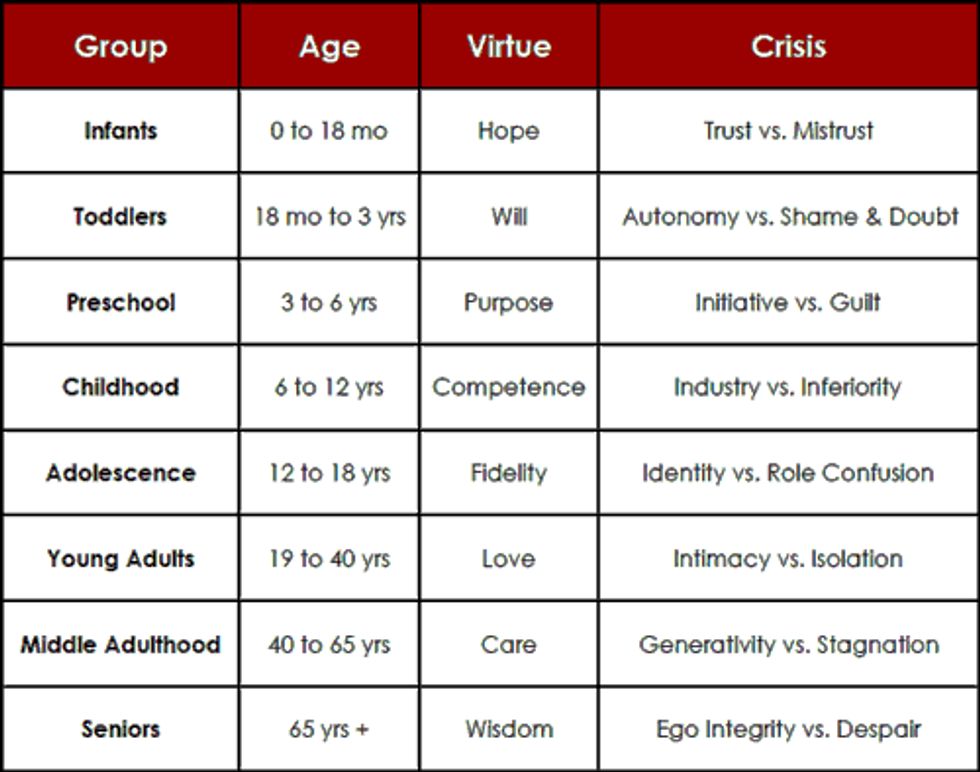Have you ever wanted to change who you are or felt like you wanted to “fix” parts of yourself or develop your past self, but you just weren’t sure you could because too much time had gone by? It’s not too late.
Erik Erikson was a German artist, teacher and psychoanalyst who shaped the way we think about ourselves and our development throughout our lives, down to our day-to-day interactions.Think about all that you had to accomplish to get to this point in your life.
Erikson was one of the first people to frame the idea that at each age, a person moves through a stage of development appropriate for their mental and physical capacities; you may have heard this referred to as “milestones.” During these stages individuals learn to make sense of feelings and personal experiences or responsibilities. Erikson refers to these stages — specifically at the earlier part of life — as “windows of opportunity” (Childhood and Society). Like most windows, it's not an open and shut case, but an “ideal” window — and then other times that it could work.
Development is subjective and different for everyone
Here are Erikson's so-called Stages of Psychosocial Development, or Eight Stages of Man:
Have you ever felt that you were going through an identity crisis? Not knowing who you are, what you’re capable of or what you want to do with your life?
If so, Erikson thinks you’re perfectly normal, in fact he even coined the term “identity crisis” because he noticed it happening so frequently. Erikson thought it not only normal but expected that individuals at all ages experience conflict as they navigate through the changes of life over time and experience. It’s difficult for us all!
Despite the expectation of feeling conflicted or struggling throughout life, Erikson also believed in the mental/emotional flexibility of us all and that “There are, therefore … few frustrations in [life] which the growing child cannot endure” (Childhood and Society). So you see, he believed in you all, and so do I.
Nevertheless, sometimes you still need or want to go back and mend things that happened earlier in your life, and there’s always time for that!
Erikson believed that our development moves with us and if one of the stages of development was not fully completed or resolved because of one factor or another, you can always go back to the heart of that issue and mend it.
Keep in mind, he was also a psychoanalyst like Sigmund Freud, and psychoanalysts are typically on board with going back into memories and investigating them in favor of helping resolve any repressed issues.
An example of this is that Erikson noticed and believed that oftentimes children — within the age window of birth to about a year — who were not able to form strong attachments with their parents/caretakers had much more difficulty developing empathy for others. We rarely think of this age as being so crucial to attachment because babies don’t have the capacity (to our knowledge) to remember things, but they still have implicit memories, often called unconscious or “muscle memory,” and they learn just as we do.
Still, I have known so many people with neglectful, indifferent or busy parents who have been unable to form strong attachments to their parents but love their friends and intimate partners unconditionally. I stress that it is different for everyone.
So no matter how you grew up or how difficult it’s been or hasn’t been, there’s always time to change if you think it would be helpful. You deserve to be the best you possible and I wish the best for all of you.
For reference this is the book used:
Erikson, Erik. (1950) 1963. Childhood and Society. 2nd ed. New York: W. W. Norton & Company.









 The minimum wage is not a living wage.
StableDiffusion
The minimum wage is not a living wage.
StableDiffusion
 influential nations
StableDiffusion
influential nations
StableDiffusion












